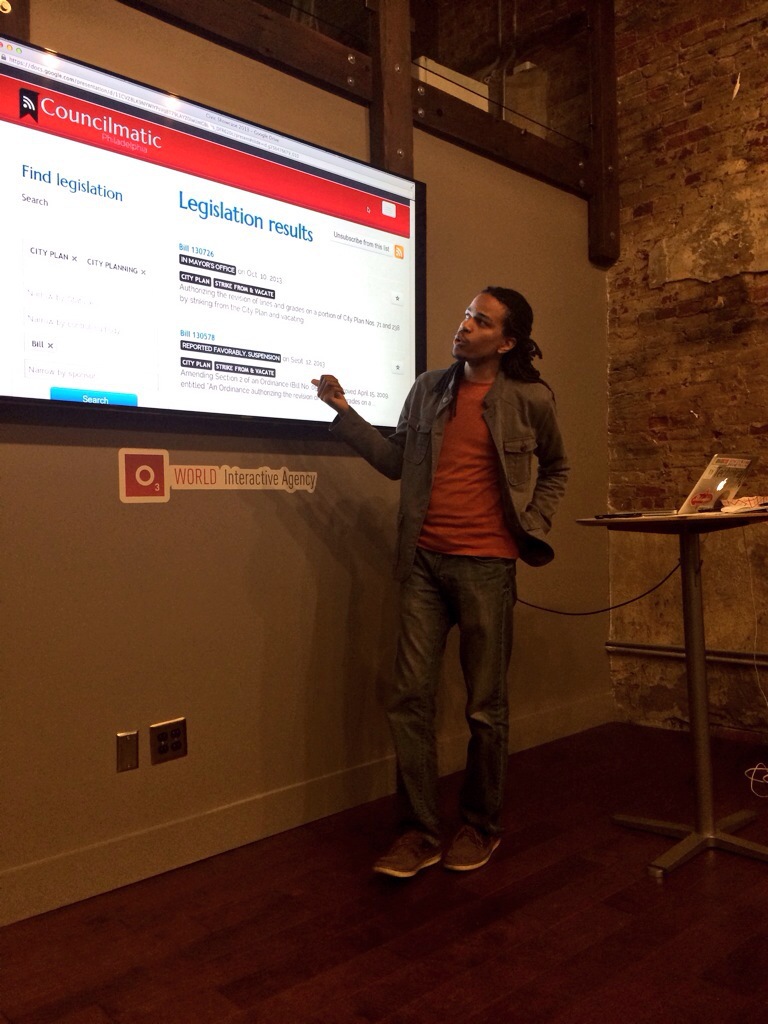Let’s celebrate the best civic hacking projects of 2013 to show what our communities can do in 2014.
After a year of technologists using open data and the power of the web across Philadelphia hackathons, meetup groups and their spare time, we asked five of the strongest 2013 examples of local hobbyist programming for good to show off how far their work has come.
Last Friday at O3 World in Fishtown, we saw demos from six interesting projects that had either been started or built upon in 2013. Those projects included:
• Grounded in Philly: a tool that helps citizens turn vacant lots — both publicly and privately owned — into green, community spaces. Launched in July, created by the Garden Justice Legal Initiative and presented by Amy Laura Cahn, this project is particularly timely with City Council’s recent approval of the Philly Land Bank initiative. Grounded’s site lists 39,216 lots with “no known use” and of those, 347 are marked as being used as community spaces.
• Bulldog Budget, launched in January by Ben Garvey, who was approached earlier this year by former City Controller candidate Brett Mandel, visualizes how every dollar of the City of Philadelphia’s budget was spent in 2012. The project gained attention for its transparency and usability, and angered some city employees whose salaries were made visible. It inspired similar projects in Chicago and Italy. A piece of advice from Garvey to aspiring hackers: Team up with a subject matter expert. Find his slides here.
• Councilmatic, presented by Mjumbe Poe is a tool to better evaluate city council legislation. It was first trialed in February 2011 and fully launched in 2012, but grew considerably this year, including expansions in Baltimore and Chicago. During his presentation, Poe also previewed myPhillyRising, a new app for community engagement he helped build for the city via his day job at OpenPlans (intro video here). Find his slides here.
• OpenTripPlanner: presented by Kathryn Killebrew, uses transit data from the Philadelphia, New Jersey, Delaware and New York City areas to help plan trips via driving, public transportation, walking and biking. It is billed as among the more comprehensive mega-regional transit apps in a world full of them. A function that allows you to choose your biking route based on preferences like quickness, flatness (using sea level data) and bike friendliness received audible excitement from the crowd last Friday when Killebrew shared a demo.
• Solar Sunflower, presented by Christopher Nies, was the lone hardware hack pitch. The learning and data collection tool uses an arduino-based system to test water quality and send its information back to a central system using a wireless signal, hence its partnership with schools (for both instruction and collection). The idea was first pitched in February by a Water Department staffer during TechCamp, then was among the top projects at a followup EduTech Hackathon, before also winning the Philly Tech Week Switch Philly demo night. Find his slides here.
To read more on the event and the projects, see Chief Data Officer Mark Headd‘s post here. To see the calendar of hackathons for 2014, visit ph.ly/hackathons.
Join the conversation!
Find news, events, jobs and people who share your interests on Technical.ly's open community Slack

Philly daily roundup: Earth Day glossary; Gen AI's energy cost; Biotech incubator in Horsham

Philly daily roundup: Women's health startup wins pitch; $204M for internet access; 'GamingWalls' for sports venues

Philly daily roundup: East Market coworking; Temple's $2.5M engineering donation; WITS spring summit

